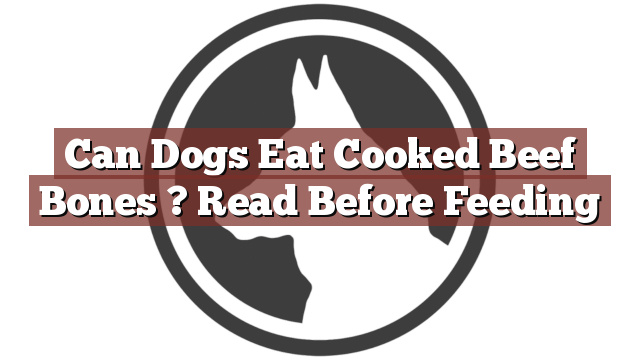Understanding Your Dog’s Dietary Needs
As a responsible dog owner, it is essential to understand your furry friend’s dietary needs. Dogs require a balanced diet that includes proteins, fats, carbohydrates, vitamins, and minerals to stay healthy and energetic. While commercial dog food provides these essential nutrients, many owners wonder if they can supplement their dog’s diet with other foods, such as cooked beef bones. However, before you decide to feed your dog cooked beef bones, it is crucial to gather all the necessary information to make an informed decision.
Can Dogs Eat Cooked Beef Bones? Read Before Feeding
Can dogs eat cooked beef bones? This is a common question that dog owners often ask. The straightforward answer is no. Although dogs naturally have a strong instinct to chew on bones, cooked beef bones can pose significant risks to their health. When beef bones are cooked, they become brittle, making them more likely to splinter and break into sharp pieces. These sharp fragments can cause various injuries, such as cuts to the mouth, throat, or digestive tract. In severe cases, it can even lead to internal bleeding or blockages, which may require immediate medical intervention.
Pros and Cons of Feeding Cooked Beef Bones to Dogs
While it is clear that feeding cooked beef bones to dogs is not recommended, it is important to weigh the pros and cons to fully understand the risks involved. One potential benefit of giving your dog a beef bone is that it provides mental stimulation and can help satisfy their natural urge to chew. Chewing on bones can also aid in maintaining dental hygiene by removing plaque and tartar buildup. However, these potential benefits are outweighed by the risks, such as the possibility of fractured teeth, choking hazards, or the aforementioned injuries caused by bone splintering.
In Conclusion: Weighing the Risks and Benefits of Cooked Beef Bones for Dogs
In conclusion, while dogs have a natural instinct to chew on bones, it is crucial to provide them with safe alternatives. Feeding cooked beef bones to dogs can lead to serious health issues and injuries, making it an unnecessary risk. Instead, consider providing your dog with specially designed chew toys or treats that are specifically made to support their oral health and satisfy their need to chew. Always consult with your veterinarian for guidance on your dog’s dietary needs and safe chewing alternatives to ensure their overall well-being. Remember, a well-balanced diet and suitable chew toys are the key to keeping your four-legged companion happy and healthy.
Thank you for taking the time to read through our exploration of [page_title]. As every dog lover knows, our furry friends have unique dietary needs and responses, often varying from one canine to another. This is why it's paramount to approach any changes in their diet with caution and knowledge.
Before introducing any new treats or making alterations to your dog's diet based on our insights, it's crucial to consult with a veterinarian about [page_title]. Their expertise ensures that the choices you make are well-suited to your particular pet's health and well-being.
Even seemingly harmless foods can sometimes lead to allergic reactions or digestive issues, which is why monitoring your dog after introducing any new food item is essential.
The content provided here on [page_title] is crafted with care, thorough research, and a genuine love for dogs. Nevertheless, it serves as a general guideline and should not be considered a substitute for professional veterinary advice.
Always prioritize the expert insights of your veterinarian, and remember that the health and happiness of your furry companion come first.
May your journey with your pet continue to be filled with joy, love, and safe culinary adventures. Happy reading, and even happier snacking for your canine friend!

